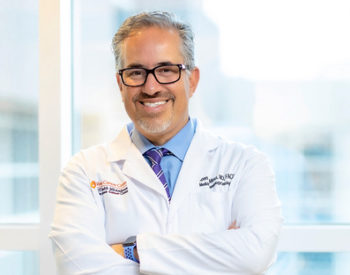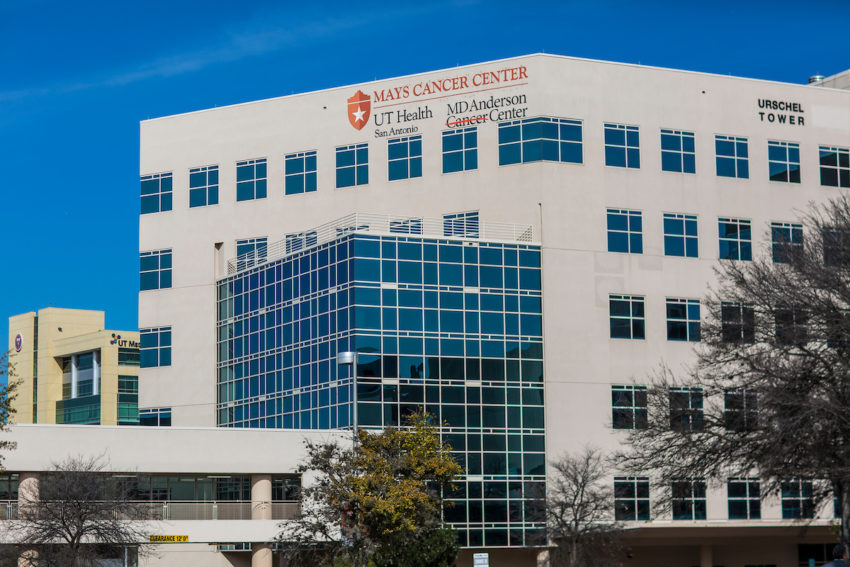SAN ANTONIO (Aug. 17, 2020) — The list of accomplishments and data supporting the renewal of the Mays Cancer Center as a National Cancer Institute-designated Cancer Center is impressive.
- 71% increase in peer-reviewed publications.
- 60% jump in research funding.
- Significant recruitment of women and Hispanics into cancer clinical trials.
- 60 new scientists recruited.
- $20.6 million renovation project completed.
And following 18 months of preparation and a site visit in February, the NCI notified Mays Cancer Center leadership Aug. 13 that its NCI Cancer Center designation has been renewed for five more years. The designation brings more than $10 million to the Mays Cancer Center and continues its legacy as one of only four NCI-designated Cancer Centers in Texas and one of 71 in the U.S.

“We owe a special debt of gratitude to the passion and commitment of our cancer center members and their efforts in cancer research, patient-centered cancer care and education,” said Mays Cancer Center Director Ruben Mesa, MD, FACP. He also thanked community leaders, partners, philanthropic supporters and UT System leadership for their support.
“We have all been working very hard, especially over the last two years, to prepare for this renewal. Since the previous renewal, we’ve recruited more than 60 world-class researchers to expand the quality and number of clinical trials we offer. We’ve significantly increased minority participation in clinical trials, obtained much more research funding, published results of those trials in high-impact journals, and revamped our building and many of our programs to improve cancer care in South Texas,” Dr. Mesa said.
The last renewal was in 2014. Typically, renewals are considered every five years, but the NCI granted a one-year extension because Dr. Mesa had just been recruited to lead the cancer center in fall 2017.
One of the most significant achievements was increasing diversity of participants in clinical trials. The Mays Cancer Center’s service area is 38 counties of South Texas that extend to the border with Mexico. “The population that we serve is about 69% Hispanic, so it is important that we try to match these demographics in our clinical trials. In 2018, 61% of women and 42% of men in our clinical trials involving treatments were of Hispanic descent. And in clinical trials that involved prevention, 72% were Hispanic women and 57% Hispanic men. Historically, clinical trials do not have a large minority enrollment, so this is important,” he explained.
Other milestones included:
- Publishing 1,086 peer-reviewed papers over the past six years, a 71% increase. Nearly a quarter of the publications were in high-impact journals.
- A 60% increase in research funding, including a 29% increase in funding from the NCI, with results of the studies submitted to peer-reviewed journals.
- Recruitment of 60 new physicians and scientists, including Daruka Mahadevan, MD, PhD, chief of the Division of Hematology and Medical Oncology; Mark Bonnen, MD, chairman of the Department of Radiation Oncology; and Patrick Sung, DPhil, a top DNA repair scientist, to the Department of Biochemistry & Structural Biology at UT Health San Antonio.
- Completing $20.6 million in renovations that included improvements to the Welcome Center, Patient and Family Services Center and chemotherapy treatment area to help patients and their families feel more comfortable.
In its report, the NCI review team said, “…the Mays Cancer Center has emerging research programs supported by strong shared resources, energized clinical research infrastructure and solid educational programs. Clear cancer focus in evident and basic discoveries are being moved through the translational pipeline. A major strength of the center is the profound commitment shown to the needs of its (38-county) catchment area, which has a predominantly Hispanic population.…Increased investments in research infrastructure, strong program leadership and robust institutional support indicate a center on an upward trajectory.”
Dr. Mesa said: “We’ve set our sights even higher to focus more comprehensively on prevention and treatment of the most common cancers in South Texas, cancer genomics and many other areas to improve cancer care in South Texas.”
# # #
The Mays Cancer Center, home to UT Health San Antonio MD Anderson Cancer Center, is one of only four National Cancer Institute-designated Cancer Centers in Texas. The Mays Cancer Center provides leading-edge cancer care, propels innovative cancer research and educates the next generation of leaders to end cancer in South Texas. Visit www.UTHealthsaMDAnderson.org.


